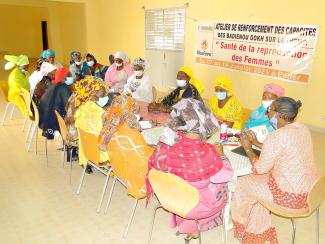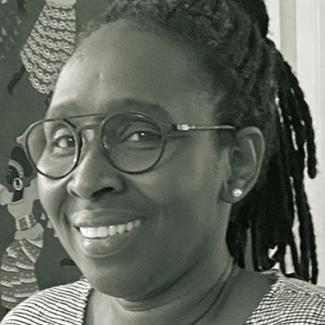Female genital mutilation
“Violence is related to a variety of social conditions”

Your organisation Forward For Women gives advice to women and girls concerning FGM. What suffering do affected women and girls tell you about?
The women are not usually interested in airing complaints or soliciting sympathy for what has happened to them. Instead, they have very practical concerns. Girls want to know what to expect, whether they will be able to experience sexuality normally, whether they will be able to have children normally and whether something can be done about the mutilation. Recently, it has become possible to reconstruct the female genitalia with a surgery.
How do you help affected women?
It depends. I have no standard response; every case is different. If the person concerned suffers pain or has another medical problem, I’ll send her to see a doctor with some knowledge of the issue. Every woman has her own way of coping with FGM. As a Black woman who has suffered FGM, I am easier to approach than a blonde, white woman would be. I try to find out what kind of advice the FGM victim needs. I have no ready-made solutions, but help the person concerned to find her personal solution. My work is actually very much about empowering female migrants.
Did the girls suffer FGM in the countries they came from or does it happen in Germany?
Most girls are refugees or migrants who were hurt in their home countries. We do not know whether FGM occurs in Germany, though we suspect it does. So far, we have no proof however. Before the pandemic, I was approached by employees from a day-care centre for children under three in Frankfurt. They believed one of the infants was an FGM victim, which is very difficult to determine for lay persons.
How did you cooperate with them?
Well, it was certainly good that they turned to me instead of directly addressing the parents and potentially accusing them of something they did not do. The staff of day-care centres here tends to have little cultural sensitivity. To improve matters, we cooperate closely with German institutions. In this particular case, I discussed things with team members from the day-care centre. The plan was to get together with the parents and assess matters in a conversation with them. That did not happen because of the pandemic, and we lost touch. If parents cooperate, the right thing to do is to have a doctor examine the child. If parents do not cooperate, we turn to the local youth welfare office because a child’s rights have been violated.
You have suffered FGM yourself as a child. For us in Germany, that seems a horribly violent act. Are you angry at your parents for having done this to you?
Well, I have never asked myself questions like that. I can’t say that I feel anger or resentment towards my parents. In some regions, FGM is a pervasive tradition. Social consensus endorses it. Everyone does FGM. I was about five years old when they circumcised me. I no longer have any clear memories. It surely hurt a great deal. But the meaning of pain is different in every culture. Circumcision marks a stage of life, like marriage and childbirth. Every girl undergoes it; that is simply the way things are. Our goal now is to show people who think that FGM is part of their culture that a different life is possible.
And how do you do that?
We see ourselves primarily as a consultancy service. First of all, it matters very much that I accept every person who approaches us for who she is. I first ask what her motives are. What does she want to change? How does she want to live? What are her goals? And I don’t judge anyone. FGM and other forms of violence can’t be viewed in isolation. We must consider them in context. They are linked to many social circumstances and situations. Probably some of these practices used to be rituals that somehow ensured survival. I want to reveal that kind of context and examine it. We also reach out to men because society as a whole will not back away from this harmful practice unless we have them on board. It is important to do this work among the diaspora community, because this community has an impact on what people do and think in Senegal, for example.
Has Covid-19 changed your work?
Well, before the Covid-19 pandemic, we held group meetings and did in-person consultations, but nowadays everything is done by phone. Moreover, it is noticeable that many women and even families are coming to us because their children are experiencing racist violence or discrimination at school. These problems are probably becoming more evident now. Many children’s school performance has suffered due to learning at home during the pandemic. In Germany, Black children are generally considered to be the least capable. Certainly, the Black Lives Matter movement has played a role too. Children are increasingly feeling that their teachers discriminate against them. When children feel discrimination, teachers and schools are often helpless or even defensive. Typically, German teachers are not capable of dealing with everyday racism, and neither are schools. Children are mostly left to themselves. Many parents feel frustrated and helpless too.
What needs to happen in your opinion?
There is structural racism in German society, but Germans are not really aware of it. Teachers and schools are overwhelmed, left entirely to their own devices. They don’t know what to do. So far, there are no specific workshops or targeted trainings that might help teachers act more competently. The best thing would be to offer anti-discrimination courses and training sessions at the school itself.
What advice do you give parents?
Above all, I tell them to talk to teachers, get in touch with school leaderships and share experiences with other parents. One option is to mention the problems at a parents’ night. We try to empower parents and children, enabling them to address the problem. There is no one-size-fits-all solution. I am familiar with the issue because, unfortunately, my own children experienced a lot of discrimination in school. When problems arose, because of a simple misunderstanding, for example, my children were always found to be at fault. They were considered to be disruptive and perceived to have violated social norms. On the other hand, my experience is that teachers would open up and act in a more positive way once they got to know me personally.
On another topic: You are also active in Senegal. What projects are you running there?
Our projects in Senegal primarily benefit women and girls. Our health and education project, Maa Feew, is especially close to my heart. This project is supported in part by the Centre for International Migration and Development (CIM), which is operated by GIZ, the German Agency for International Cooperation. “Maa Feew” means “everything will be all right” in Fulani, a language spoken in Senegal. We are conducting the project in Podor, a city in the country’s north, where I was born. It provides support for a birthing centre and the construction of school bathrooms and a library. The birthing centre is especially important. Since FGM and early and forced marriage are practised in Podor, complications during childbirth are common. With support from the Arbeiter-Samariter-Bund Hessen, a German humanitarian organisation, we were able to obtain an ambulance for the birthing centre. It transports around 70 women a month 400 kilometres from the hospital in Podor to the capital, Dakar, where they can receive better care in case of difficult deliveries or illness. My grandfather used to be the principal of the school we are supporting. So far, the construction and renovation of the bathrooms has not been completed, nor has the construction of the library. We need more donations, which unfortunately is also true of other projects.
Which projects?
We would love to establish a girls’ home in Podor, where girls who have been circumcised, undergone forced marriage or subjected to other forms of violence can find a safe haven, health care and support. Another important goal of ours would be to obtain two vehicles so that we can provide health counselling and care in and around Podor. It is conducted by women – traditional health assistants – who have been trained for this purpose. That kind of outpatient counselling is the only care that many women and girls can access. We very much hope that we will soon receive the donations we need to carry out these projects.
Mariame Racine Sow works as a counsellor at a refugee centre run by Arbeiter-Samariter-Bund, a German humanitarian organisation, in Frankfurt. She volunteers at her organisation Forward For Women.
mariame.sow@forwardforwomen.org
https://forwardforwomen.org/













